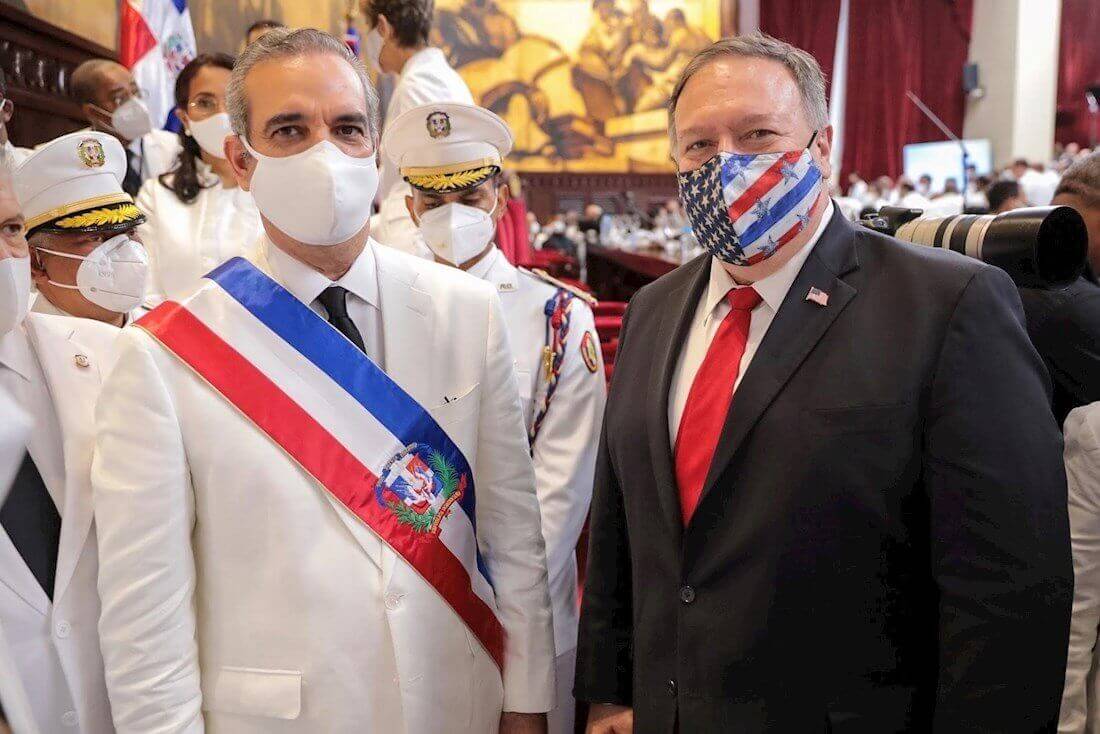Luis Rodolfo Abinader was sworn in as Dominican Republic’s 54th President on Sunday, and was joined by US Secretary of State Mike Pompeo to celebrate his July 5 electoral victory, potentially marking a new era in US-Dominican bilateral ties.
Abinader’s victory signals a shift from the centre-left Dominican Liberation Party (PLD), which had ruled the country for the past sixteen years. It is hoped that this change will usher in a improved economic and diplomatic cooperation between the US and the Dominican Republic.
His victory came against the odds, as, last year, the PLD attempted to enact a constitutional amendment that would have made it possible for the now ex-President Danilo Medina to seek a third consecutive four-year term. At the time, Pompeo spoke with Medina and reiterated the importance of “preserving democratic institutions, and adherence to rule of law and the constitution, particularly in the lead-up to the 2020 elections”.
Medina relented under US pressure and agreed not to press ahead with his initial plans to change the constitution and allowed another candidate from the PLD to run in his stead. Unfortunately for him, this paved the way for a fairly simple victory for Abinader.
The Dominican Republic is heavily dependent on the US, with the majority of its agricultural and mining exports headed to America. Americans also form a huge proportion of tourists entering the country. Simultaneously, there is a huge diaspora of Dominicans residing in the US, with up to two million Americans having ties to the Caribbean country. Dominican-American voters are particularly crucial in swing-states like Florida and Pennsylvania, and thus both Democrats and Republicans find it beneficial to pander to these communities, especially ahead of the November election in the US.
The Dominican also serves as a check on Chinese influence in the region, which was underscored this week, when the country was the only one to support the US’ resolution to extend and arms embargo on Iran in the United Nations Security Council (UNSC). It forms part of the bedrock of US-allied nations in the region, and is joined by Mexico, El Salvador, and Guatemala. At the same time, Washington can use Santo Domingo as an offshore ‘logistics hub’ by expanding cooperation on port security and monitoring of drug trafficking.
In addition, there are also 110 players from the Dominican Republic in Major League Baseball (MLB) teams and virtually all MLB teams have “baseball schools or talent scouts” on the island nation. Thus, maintaining strong ties with the country proves highly beneficial for US businessmen looking to capitalize on highly marketable and lucrative sporting talent.
In his first speech, Abinader, representing the Modern Revolutionary Party (PRM), vowed to increase the nation’s health budget in light of the growing coronavirus crisis, which has thus far infected over 85,000 people and killed more than 1,400 people in the country. He also announced an expansion of the welfare program.
New Dominican President Sworn In, Pompeo Attends to Mark Shift in Ties With US
Abinader’s victory signals a shift from the centre-left Dominican Liberation Party.
August 18, 2020

Dominican President Luis Rodolfo Abinader (L) and US Secretary of State Mike Pompeo (R), pictured at the former’s swearing-in ceremony on Sunday. SOURCE: AL JAZEERA
